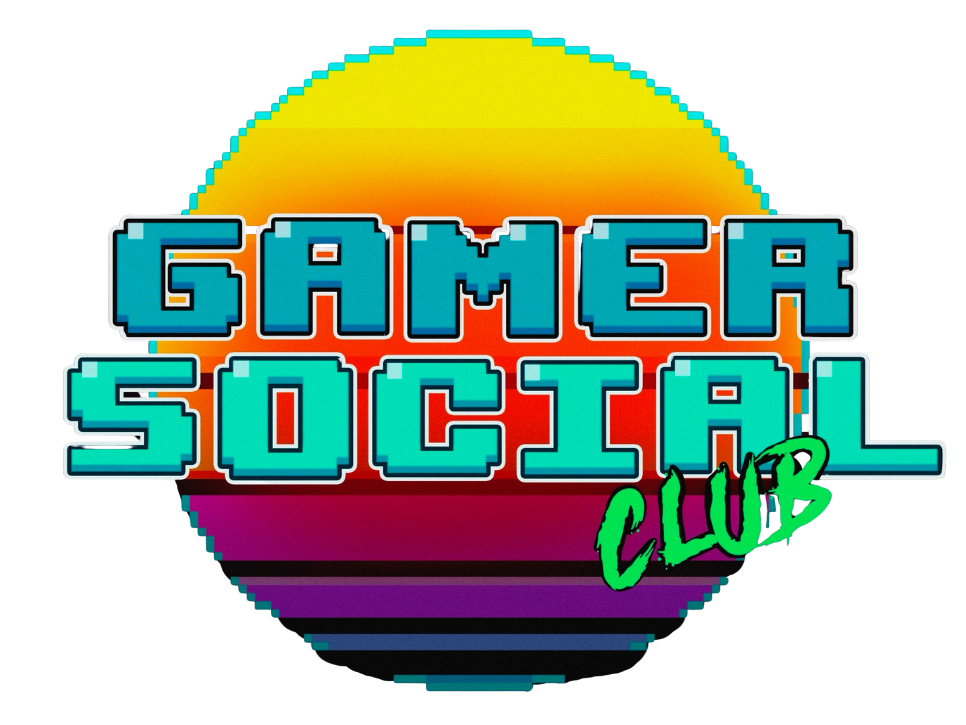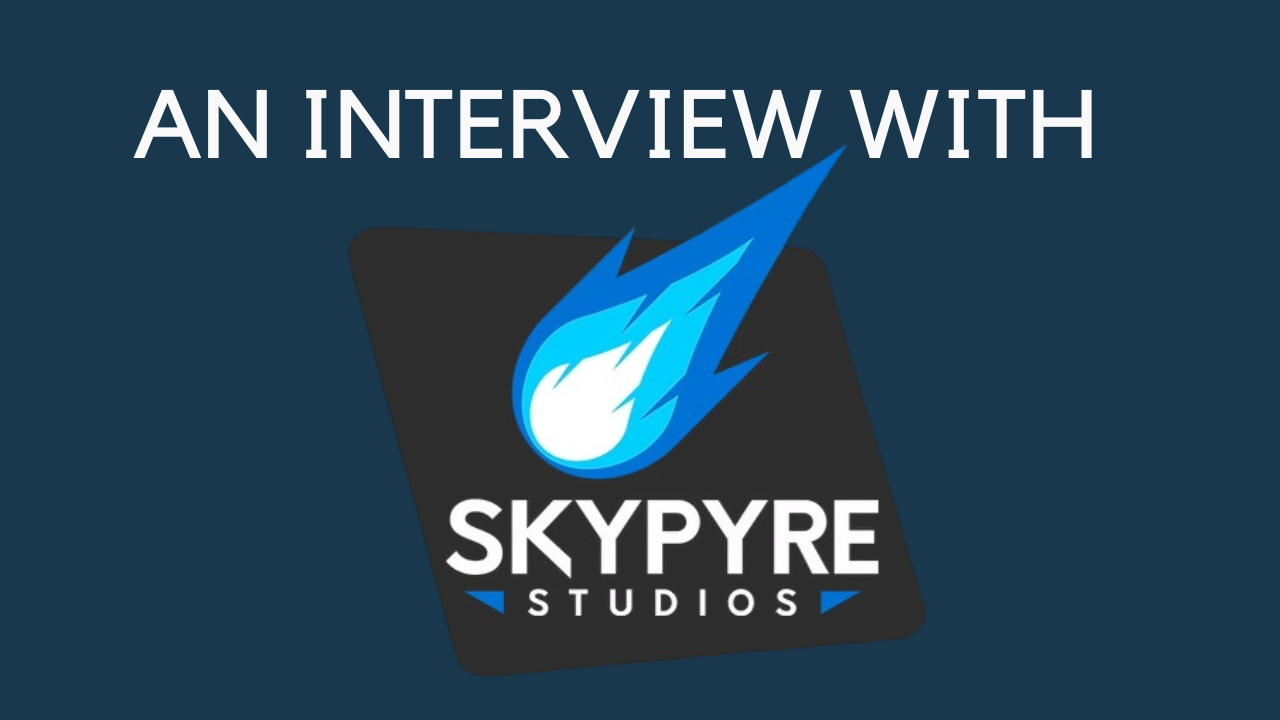I had the chance to meet up with the team from SkyPyre Studios at Ottawa Comiccon recently, and it quickly became clear just how much passion and creativity they bring to indie game development. Based in Ottawa, SkyPyre has been carving its own path in the local scene ever since a group of Carleton University Interactive Multimedia and Design students decided to turn their capstone project into something bigger.
Nearly a decade later, SkyPyre has grown into more than just a company, it’s a community of friends and creators who continue to experiment and collaborate make the kinds of games they want to see in the world. From their early project Halen: Ballad of the Blade Thief to current works like Alt-Fire, Armored Tussle, and Mushroam, SkyPyre is balancing ambition with creativity, proving that the indie spirit is definitely alive and thriving in Canada.
I took the opportunity to talk to Nick Burns, Studio Director, and Mathieu O’Brien, Marketing Director, about how SkyPyre began, what keeps them motivated, and where they see both their studio and the Canadian indie scene heading next.
SkyPyre is an indie studio based out of Ottawa. How did you all meet and what motivated you to create a studio?
Nick: The founding members of SkyPyre (SP) met as students of Carleton University’s Interactive Multimedia and Design program (IMD for short). The 6 of us had been working together for years on group projects, mostly games, and decided to continue that into our senior capstone project. Over the next 12 months we built our first full game, Halen: Ballad of the Blade Thief, and scored quite well with it. After that it was an obvious jump to consider sticking together post graduation, and so SkyPyre was born.
I can’t speak for everyone, but one key factor for me, outside continuing to work together, was that I couldn’t leave Ottawa for personal reasons, which if you want to make games can be a problem in that most of the studios are in Montreal, Toronto or Vancouver – especially in 2017. So I figured “if I can’t move to the jobs, I’ll make my own”.
Mathieu: Another reason for creating our own studio was, at least for me, that we would have full creative control. While it could be exciting to work on big-name games at well known companies, the games wouldn’t feel quite our own so much as we simply contributed to some part of it. As our own studio, we get to work on any project we want and take on whichever role we want. For example, the group as a whole generally works on the game design, then I often also work on the UI design, and more. It really connects you to the whole project.
What’s the story behind your studio name?
Nick: “SkyPyre” came about because for senior project you have to set your team name – part of the vibe is pretending to be working on a full product, marketing and all. I’d tried to get a bunch of ‘studio names’ off the ground for years with various of the group members, but we needed something new to represent all of us. One of the other founders and teammate Michael Dillabough had made this pixelated meteor logo for graphic design class back in 1st year and we all liked it – so it stuck. Had we known where we’d end up, I might have picked a different name, because I am very tired of my autocorrect using “skyfire” or “skype hire” lol.
You describe SkyPyre as “a community more than a company.” What does that mean in practice, and how does it shape your approach to making games?
Nick: I think in order to understand that, you have to know some of the history. We definitely started with intentions of being a “company” in the traditional sense. Where we were aiming to do SP full time and have it pay our bills. That being said, we knew it was a dicey endeavor, so we had to individually get some full time jobs on the side so we could avoid crashing out.
Flash forward nearly a decade, a few more games shipped, everyone going places with their lives, and the vision stopped fitting the team’s makeup. Some of SP had really leaned back away from development work, some of us were doing our own thing, and we realized this ‘one project team’ idea wouldn’t work. We had such varied interests, and without some of us taking the risky plunge, it couldn’t get off the ground as a proper “company”. But, it was still a decade of work and team building, so we pivoted.
The community element refers to the fact that we now treat SP as an umbrella for creativity and discussion. Most of us are working solo or in small sub-teams on projects, bouncing ideas off everyone, but mostly under this SP label. I often liken it to a publisher role, where the only games we publish are the ones each of us makes. What this approach means for us is I can work on a project myself with all the support of the team, but not need to bog them down with needing them to do work on it, or contribute creatively. The result is longer, slower dev cycles, but the fruits of those are starting to come to fruition now as titles like Alt-Fire, Abyrinth, Mushroam and even other mid-cycle projects we have in the works.
Not to mention as it was in the beginning, we are all friends and value that relationship as well.
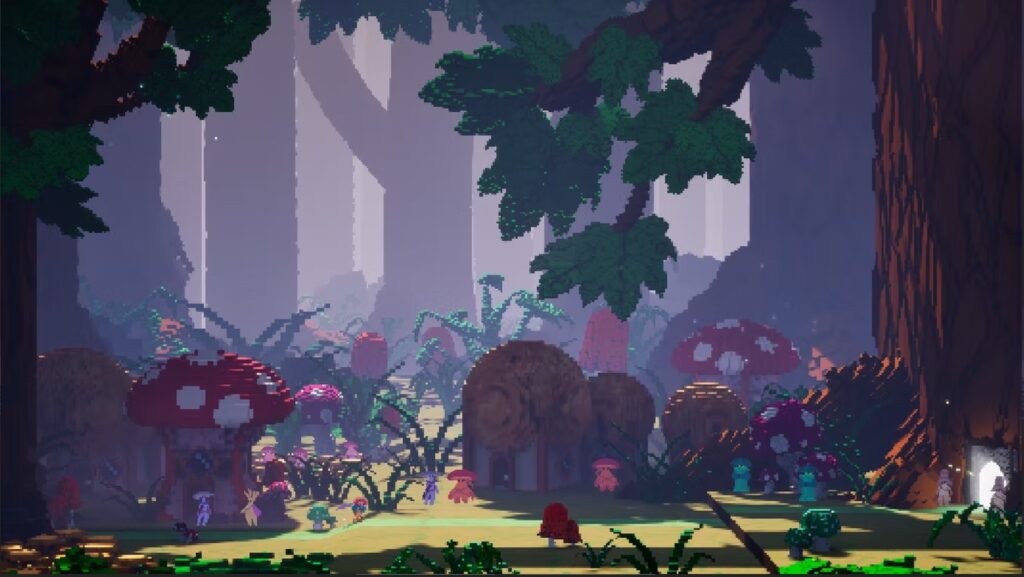
Since everyone contributes in their spare time, how do you balance work, personal life, and game development without burning out?
Nick: Haha, I don’t. Jokes aside, it is a challenge for sure. I can only speak for myself in this regard, but my work with SP definitely ebbs and flows. I have periods where all I want to do is make games, periods where I just want to play games, and periods where I just don’t have time for either. Ask me each year since we started and I’d give you a different answer, and I betcha I’ll be figuring it out for the next decade too. But I think at the end of the day I do this because I love it. For me, it’s the ultimate form of creativity – and I have to find a way to make it happen – so I keep taking cracks at it.
Mathieu: As Nick said, it’s the ultimate form of creativity. From what I’ve seen over the years, every member of SkyPyre has a million things they’re constantly bouncing between in their lives, but the main overlap is the gamedev itself. It uses such a variety of skills that it never feels stale, which is why, I think, we keep coming back to it. Even if someone only has a small bit of time to dedicate in a given week, that’s enough to contribute in their way without burning out toooooo badly.
What tools or habits have proven most effective in keeping the team connected and projects moving forward despite part-time schedules?
Nick: One of the best tools we’ve ever had for sure is Discord. Our whole studio operates off that – chats, voice channels, screen sharing, generous file sharing, polls, etc. Each project has had different approaches for project management, earlier ones used project management platforms like Jira, Clickup, etc – eventually we simplified things down to Trello, and at some point we didn’t have anything! These days we’ve worked our way back up to Trello for Mushroam, since a giant checklist in a Google Doc wasn’t great.
As for habits, the main one is that – for as long as SP has existed I think – we’ve met weekly on Tuesday nights. Used to be all together at one of our houses, during and post pandemic online via Discord. Actually meeting and talking to teammates I think is critical.
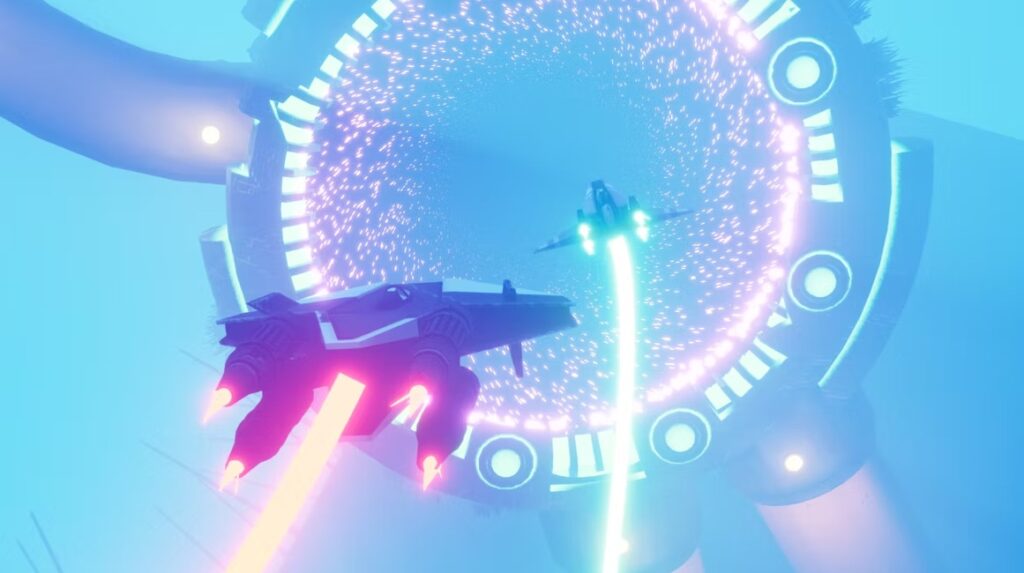
How do you decide which projects to pursue and who takes the lead on them?
Nick: When we started, it was mostly about which projects looked feasible and that everyone was interested in. But as we’ve expanded outward and become more flat, it’s decided by the person that starts the project, or an agreement between creative disciplines.
For example, my shooter project Alt-Fire is led by me, since I am the original creator of it. Abyrinth is a narrative action game being co-created by David Dunkelman and Michael Dillabough, and between them they take leadership of different elements. Mushroam is more complex since it just started as a gamejam game – equally started by the 5 mush devs – but I think its relative simplicity makes it easier to divide up based on interest (me on code and systems, Jason Hein on level design, David on pixel art and art direction, etc).
Many student-formed studios fizzle out, what do you think has kept SkyPyre connected and motivated all these years?
Nick: One of the main things is that pivot we did a few years ago. I think so many student-formed teams fizzle out because they are focused on the business side of it and making that a success. To be clear, that isn’t a failing, that is just a different goal – one that is harder to achieve in our challenging industry and economic system at large. We just saw that if we kept trying to “make it big” we would fizzle out, so we changed our goals to match what we really wanted to do.
Make no mistake though, if someone dumped a million dollar dufflebag on my doorstep I would be doing SP full time for sure!
What’s your team’s proudest moment in development so far?
Nick: Oh man there are so many – hard to name just one. A few that stick out are going to EGLX pre-pandemic, the year we went ham on Extra Life and raised a few thousand for CHEO, and of course that first time you press “Release my game” on Steam and ship something out to the players.
SkyPyre currently has several projects in development, including Armored Tussle, Alt-Fire, and Mushroam. Can you tell us a bit about each game and what excites you most about them?
Nick: Well I can talk about Armored Tussle and Alt-Fire since those are my two projects besides Mushroam. Alt-Fire is a fast paced action shooter inspired by arena shooter classics like Unreal and Quake, where you fight your way across an eclectic sci-fi galaxy in search of the truth. Honestly the most exciting thing for me there is just finally making a shooter myself – a life long FPS player and modder, it’s great to build and bring my style to my own.
As for Armored Tussle – that is a classic case of “whoops put that on steam too early”. The game was missing a thematic hook so it ended up being a solid year of burnout in the wrong direction – but that doesn’t mean its toast! I have ideas for it, but that will come later – I’m focused on Alt-Fire for now.
Mathieu: Mushroam is the latest addition to SkyPyre’s game roster since it was only started at the end of January 2025 as part of Global Game Jam. It’s a singleplayer 2D puzzle platformer where the player takes on the role of a tiny mushroom person who goes on a subterranean quest to save their village. I find a few things to be exciting about it. First off, the game is very different from anything we’ve made before. Its vibe is so serene which is helped by the music, the pixelated art style, colourful landscapes, and gameplay pace. I’m also excited that we’ve returned to a singleplayer game. It was fun to explore multiplayer games through The Blobs Fight and Evasive Maneuvers, but singleplayer is a very different gaming experience and is more inline with our project goals.
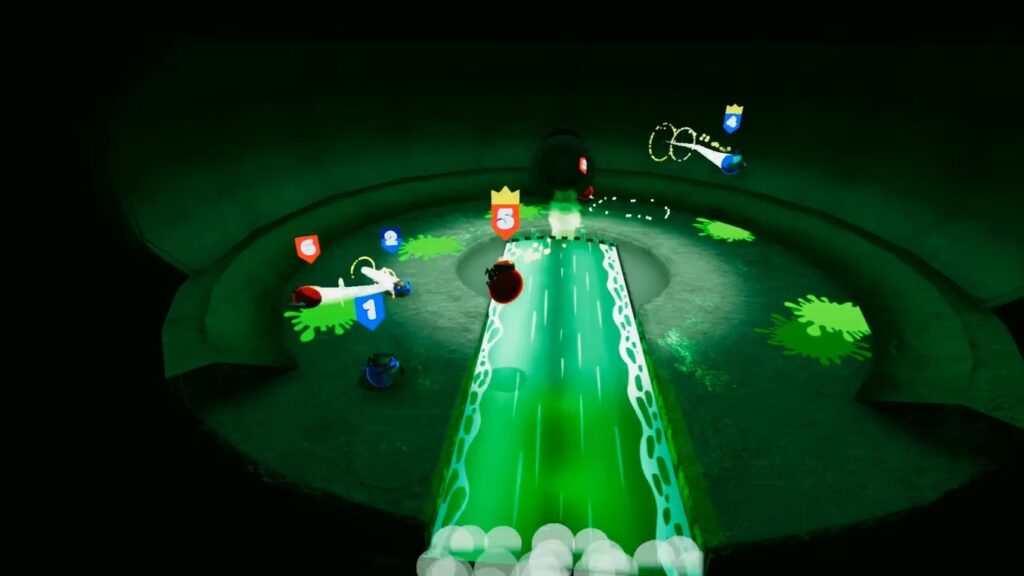
Are there gameplay mechanics, art styles, or narrative ideas that have carried over from one project to another, or do you intentionally keep each game distinct?
Nick: I think we tend to keep things pretty distinct, each game is its own puzzle to design right so we try and leave the door open. The closest thing is every game of ours has a super jump bug in it somewhere – I don’t know how it keeps happening, but there is always some kind of wild exploit. Honestly – not mad.
As an indie studio based in Canada, how do you see the current state of the Canadian indie game industry?
Nick: Well much like the rest of the industry – it’s a little on fire at the AAA level – but AA and Indie are continuing to build momentum and I believe there has never been more game development talent in Canada than right now. These days you can’t scroll best sellers without hitting Canadian talent.
Are there unique challenges or advantages to being an indie studio in Canada compared to other regions?
Nick: I can’t speak to other regions, but being Canadian (Ontario) we do have a number of grants that can help, and an amazing community of fellow Canadian developers who at every turn have treated us as friends and not competition – which is refreshing.
What advice would you give to aspiring Canadian indie developers looking to start their own studio?
Nick: Just do it. If you have any time to give it at all, just start. Don’t worry about making a business right away, or making a studio, or even having a team. This industry needs more amazing developers and their incredible ideas, and the only way they stand a chance to be seen is if you make them. Begin building your game from the heart, and let the business elements fall into place.
Closing Thoughts
The developers at SkyPyre Studios are a close-knit team with a strong passion for their craft. Their catalogue continues to expand, with each release offering a distinct and original experience. To learn more about their work, visit SkyPyre.com.
A special thanks to Nick Burns and Mathieu O’Brien for taking the time to share their insights. I encourage readers to check out SkyPyre’s ever expanding lineup of games. We’re certainly excited to see what their future holds.
